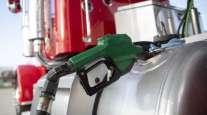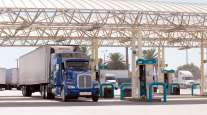States Step In to Fund Roads After Trump’s Plans Stall

Governors in at least 11 states, including Michigan, Ohio and Connecticut, are pushing for new taxes, bond sales and tolls to raise money for long-needed work on roads, bridges and transit systems after President Donald Trump failed to enact a major infrastructure plan.
The push to raise billions of dollars comes after a crop of new governors from both parties took office in January. The proposals by state officials, many of whom pledged during their campaigns to boost spending for public works, marks an early effort to set their agendas and reflects expectations that there won’t be money coming from a federal government dealing with a rising budget deficit and a politically divided Congress.
“Because folks aren’t waiting for Washington anymore, it creates extra impetus at the state level,” said Adie Tomer, an infrastructure expert at the Brookings Institution.
The decade-long economic expansion has significantly improved the finances of America’s state governments, leaving officials more comfortable with putting money into construction work that was delayed amid the crippling budget deficits left by the Great Recession. But the fiscal austerity that lingered in the nation’s capitals for years hasn’t completely disappeared, with the pace of state and local construction spending and debt sales still below their one-time peaks and politicians likely to face political resistance to tax increases.
Montana Gov. Steve Bullock, a Democrat who has proposed investing $290 million in his state in part by selling bonds, said an infrastructure plan has eluded the state for six years because lawmakers have resisted taking on more debt.
Raising the gas tax is one of the most prevalent options under consideration, according to the American Road & Transportation Builders Association, which says there are proposals in 22 states to increase different types of motor-fuel taxes. The group, which advocates for more transportation funding, estimates that there have been 185 bills introduced in 37 states in the first two months of the year aimed at boosting transportation funding, more than it saw during the same period of 2018.

“States are really making up for some lost time,” said Alison Black, the chief economist for the organization.
Michigan Gov. Gretchen Whitmer, a Democrat, is proposing one of the biggest increases to gas taxes, seeking to raise her state’s by 45 cents to generate $2.5 billion. “If we want to fix the damn roads, we must invest in our infrastructure,” she said in a March 5 address.
That’s a step that Republicans are also considering, despite the party’s aversion to tax hikes. Alabama Gov. Kay Ivey, a Republican, proposed a 10-cent increase to the state’s gas tax, which would be phased in over three years. She cited a “sense of urgency” to find new revenue amid uncertainty about how much the federal government will help, her office said in a statement.
Ohio Gov. Mike DeWine is asking the legislature controlled by his fellow GOP to pass an 18-cent increase to the state’s gas tax, which he said hasn’t been raised since 2005. Last week, the Ohio House voted to increase the levy by 10.7 cents over two years, and DeWine said he’d work with the Senate to improve it.
Connecticut Gov. Ned Lamont, a Democrat, last month proposed tolling for transportation funding. New York Gov. Andrew Cuomo, a Democrat, wants to institute a fee on motorists driving into Manhattan to infuse money into the cash-strapped Metropolitan Transportation Authority.
In Pennsylvania, Gov. Tom Wolf, a Democrat, wants the state to invest $4.5 billion in infrastructure projects over four years. He’s calling for a severance tax on natural gas — but he faces a GOP-controlled state legislature that has rebuffed that idea before on the grounds that it will put its energy companies at a competitive disadvantage.
Others are seeking to borrow instead. Missouri Gov. Mike Parson, a Republican, is pushing for $351 million in bonding for state bridge projects after voters rejected a gas-tax increase last year, though a key Republican has pushed a smaller $100 million plan. North Carolina Gov. Roy Cooper, a Democrat, wants to put a $3.9 billion general-obligation bond on the ballot in 2020 to help finance water and sewer projects and schools.
“Other states have chosen to incur reasonable borrowing rather than passing on crumbling infrastructure to their kids,” said Montana’s Bullock. “We are out of step with the rest of the country.”




